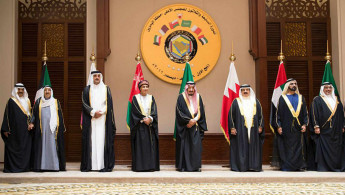Kuwait Emir 'stopped GCC split' amid Qatar blockade
Kuwait's Emir Sheikh Sabah al-Jaber al-Sabah stopped the official division of the Gulf Cooperation Council (GCC) during his visit to Saudi Arabia last week, sources revealed to The New Arab.
Sheikh al-Sabah prevented a formal split in the council which has been ravaged by a dispute involving Saudi Arabia, the United Arab Emirates and Bahrain – all of which have imposed a blockade on neighbouring Qatar since June.
Sources said Saudi and Emirati authorities had sought to relocate the upcoming GCC summit in December from Kuwait to Riyadh, a move that would allow the Saudis to exclude Qatar from the conference.
However calls to relocate the summit were rejected by al-Sabah who preferred the summit be postponed to a later time to include all six nations after solving the ongoing crisis, the sources said.
The plan to delay the summit was confirmed by a Kuwaiti foreign ministry official on Sunday who told The New Arab that "it is certain that the Gulf summit in Kuwait will not be held on schedule this year and will be postponed indefinitely".
Meanwhile, Qatar's foreign minister said Doha "has not received an official message to postpone the Gulf summit", which it views as a "golden opportunity to at least start a dialogue in a civilised manner and in accordance with the accepted diplomatic channels," he told a press conference on Sunday, adding that any delay is due to the intolerance of the blockading states.
'Not ready to talk'
The latest comments came as US Secretary of State Rex Tillerson said talks between the feuding Gulf states remained unlikely, as the Saudi-led boycott of Qatar nears its sixth month.
"We cannot force talks among people who are not ready to talk," Tillerson said at a press conference in Doha.
"There is not a strong indication that parties are ready to talk yet," he added. "We cannot and will not impose a solution on anyone."
Tillerson also aimed to persuade the feuding Gulf states to open dialogue, according to US officials, months into a crisis that has seen Qatar isolated from its neighbours.
Saudi Arabia, the United Arab Emirates, Bahrain and Egypt in June announced they had cut all relations with Qatar, accusing Doha of ties to Islamist fundamentalists and Iran.
Qatar has categorically denied the allegations and has rejected the conditions of a proposed settlement to the diplomatic and economic boycott.
Riyadh's demands are not entirely clear, but they include the closure of media outlets such as Al Jazeera and The New Arab, mothballing a Turkish military base in Qatar, and payment of "compensation" to Gulf states and Egypt.
While Trump had initially appeared to support Saudi Arabia in isolating Qatar, he has since called for mediation and predicted a rapid end to the crisis.





 Follow the Middle East's top stories in English at The New Arab on Google News
Follow the Middle East's top stories in English at The New Arab on Google News
![Israeli forces ordered bombed Gaza's Jabalia, ordering residents to leave [Getty]](/sites/default/files/styles/image_330x185/public/2176418030.jpeg?h=a5f2f23a&itok=_YGZaP1z)

